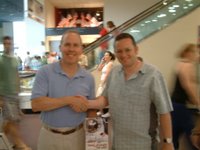
I was in Washington DC a few weeks ago, just before the successful launch of the space shuttle Discovery, and was back home when it successfully touched down after an excellent mission. I know it touched down successfully because I read about it on page 23 of my morning paper, in a little box with a tiny black and white picture.
Space travel simply doesn't have the cache it did nearly 40 years ago when the US v Russian space race was at its height.
Key to my trip to Washington was time spent at NASA's HQ researching the events that led to - and came out of - the Apollo 1 fire which took the lives of three American astronauts back in January 1967. I spent a morning in the basement of NASA's faceless and unprepossessing 1960s office building working through some of the records relating the the investigation that happened after the crash, musty papers that had hardly been touched for 30 years or more; details of the findings that put man on the moon just two and a half years after the accident.
A day later, I was in the National Air and Space Museum's bookshop browsing for something to read on the flight home. Gripped by my new space exploration awareness, I picked up a new Smithsonian publication by a Shuttle astronaut - Tom Jones. Skywalking is a very good read and gave me far more insight into the Shuttle and more so, the International Space Station. I was reading the book in parallel to James Hansen's biography of Neil Armstrong - First Man and the contrast could not have been more vivid. Armstrong's a private man; a man of few words who took an engineer's approach to space flight. The book is high on technical detail, but low on unlocking Armstrong's personality - he simply isn't the subject for that kind of approach and the book is far more successful as a comprehensive historical record, than an insight into Armstrong's soul.
Skywalking on the other hand is very personal, very friendly in tone and very approachable. Despite his background flying B52s and working for the CIA, Jones comes across as likeable, an enthusiast and someone who wants to explain space to the masses. He perhaps isn't critical enough of the powers at NASA - saving his barbs for the Russians - and he never seems to have worked with a crewmate who's anything less than perfect - which perhaps stretches credulity a bit.
But, having bought Tom Jones' book in the museum's upstairs bookshop, I walked downstairs to find him setting up for a book signing. My first astronaut......and he turned out to be a really nice bloke. He signed his book for my son, posed for a picture - and, as the signing hadn't quite started, took some time to chat.
I explained I was researching a piece on Apollo 1, and Tom turned out to be something of a historian of the event and had the huge jump on me in that he's seen the remains of the command module which is still kept at Langley.
The premise of my piece is that Armstrong wouldn't have got to the moon when he did but for the fact of the launchpad fire - which led to over 1,000 improvements to the module in the 21 months that Apollo was grounded. Tom added to that stating that museums like the National Air and Space should do more to recognise NASA's failures as well as celebrating their triumphs, since those triumphs are built on the lessons learned from Apollo 1, from the rockets that blew up before man was launched into space, and from the terrible accidents that befell the Shuttles Challenger and Columbia. He'd like to see at least a piece of the Apollo 1 capsule displayed in Washington - perhaps something that could be done to commemorate the 40th anniversary of the accident.
It was no surprise when, back in the UK, I turned on Fox's coverage of the Shuttle launch to find Tom Jones providing the expert analysis. He has the gift for making complex stuff simple - a rarew gift among space folk.
Anyway, Discovery's safe landing seems to show that NASA is prepared to learn from its mistakes. It's still prepared to push frontiers, but will do things differently.
Somehow that's at odds with too many of our political leaders around the world who keep doing the same old same old - and expecting to get a different result.



1 comment:
No comments recently - not surprising as I'd inadvertently stopped allowing any. Rectified now.
Post a Comment